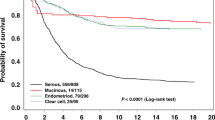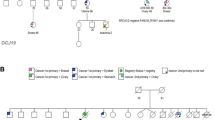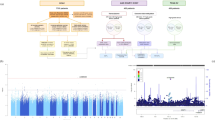Abstract
The importance of polymorphism in the glutathione S-transferase GSTM1, GSTT1 and, cytochrome P450, CYP2D6 loci in the pathogenesis of epithelial ovarian cancer has been assessed in two studies; firstly, a case-control study designed to determine the influence of these genes on susceptibility to this cancer, and secondly, the putative role of these genes in the protection of host cell DNA has been studied by comparing p53 expression in patients with different GSTM1, GSTT1 and CYP2D6 genotypes. The frequencies of GSTM1, GSTT1 and CYP2D6 genotypes in 84 cases and 325 controls were not different. Immunohistochemistry was used to detect p53 expression in 63 of these tumours. Expression was found in 23 tumours. Of the patients demonstrating immunopositivity, 20 (87%) were GSTM1 null. The frequency distributions of GSTM1 genotypes in p53-positive and -negative samples were significantly different (P = 0.002) and those for GSTT1 genotypes approached significance (exact P = 0.057). The proportion of patients with both GSTM1 null and GSTT1 null was also significantly greater in the immunopositive (4/22) than in the immunonegative group (1/40) (P = 0.0493). Single-strand conformational polymorphism (SSCP) analysis was used to detect mutations in the 23 tumour samples demonstrating p53 positivity. A shift in electrophoretic mobility of amplified fragments was found in 11 patients (exons 5, 6, 7 and 8) and these exons were sequenced. In eight samples a mutation was found. No SCCP variants were identified in the other 12 immunopositive patients. Sequencing of exons 4-9 of p53 from these tumours resulted in the detection of mutations in two patients (exons 5 and 7). Thus, in 23 patients who demonstrated immunopositivity, p53 mutations were found in nine patients with GSTM1 null (90.0%). In the 13 patients in whom no mutations were identified, 11 were GSTM1 null (84.6%). The data show that overexpression of p53 is associated with the GSTM1 null genotype. We propose the data are compatible with the view that GSTM1 and GSTT1 are critical in the detoxification of the products of oxidative stress produced during the repair of the ovarian epithelium. Thus, failure to detoxify products of this stress may result in damage to various genes in the host cell, including to p53, resulting in persistent expression of mutant protein. In other patients, oxidative stress effects damage to various genes, but not including p53, resulting in overexpression of wild-type p53.
This is a preview of subscription content, access via your institution
Access options
Subscribe to this journal
Receive 24 print issues and online access
$259.00 per year
only $10.79 per issue
Buy this article
- Purchase on Springer Link
- Instant access to full article PDF
Prices may be subject to local taxes which are calculated during checkout
Similar content being viewed by others
Author information
Authors and Affiliations
Rights and permissions
About this article
Cite this article
Sarhanis, P., Redman, C., Perrett, C. et al. Epithelial ovarian cancer: influence of polymorphism at the glutathione S-transferase GSTM1 and GSTT1 loci on p53 expression. Br J Cancer 74, 1757–1761 (1996). https://doi.org/10.1038/bjc.1996.626
Issue Date:
DOI: https://doi.org/10.1038/bjc.1996.626
This article is cited by
-
Genetic polymorphisms and gene-dosage effect in ovarian cancer risk and response to paclitaxel/cisplatin chemotherapy
Journal of Experimental & Clinical Cancer Research (2015)
-
Polymorphisms of glutathione S-transferase M1 (GSTM1) and T1 (GSTT1) in ovarian cancer risk
Tumor Biology (2014)
-
Association between glutathione S-transferase M 1 null genotype and risk of ovarian cancer: a meta-analysis
Tumor Biology (2013)



